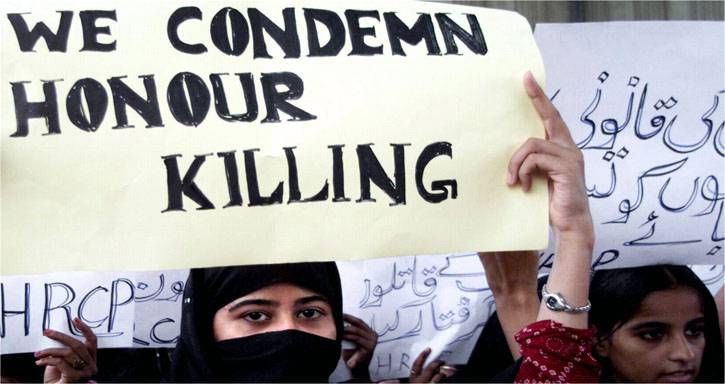
“I proudly call myself a tribal woman, and I carry with me hundreds of stories that have shaped and enriched my life and connected me to every single woman in my country”
At its heart, Khalida Brohi’s book is about the nameless and faceless girls who have been victims of the cultural misappropriation of the word ‘honour’. The pivotal point of the story is the murder of Brohi’s cousin who pays with her life for falling in love with a man she is not betrothed to. She writes about it as follows: “The distinction between childhood and adulthood was all but nonexistent for these families, and there was certainly no such thing as adolescence.”
This particular incident inspires the writer to adopt the path of activism by seeking justice for the many girls and women who have suffered from this senseless practice.
Brohi’s book has an authentic feel running through the pages because it is mainly anecdotal and based on first hand experiences. Her biggest ally and support since childhood is her father, who supports her education in the face of opposition from his family. And she feels that education is what has set her apart from her cousins through the years.
She writes about this feeling as follows: “Here was proof that confidence and self-belief have tremendous power, are even the most important factor in accomplishing anything.”
Brohi’s journey with her family into the city sees her campaigning for the rights of women, and opening literacy and skills development centres. Her efforts and networking with people in Pakistan and abroad brings her recognition and puts her in contact with international players in the IT and development sector.
At the point in the book where the writer describes her plans and business correspondence, it becomes unnecessarily lengthy and one begins to feel less engaged in the book. This part begins to feel like a daily diary of correspondence.
However, the writer also describes how her single-minded focus also begins to affect her judgment and her relationships with those close to her and she realises that she needs to work on this issue.
Brohi also exposes the reader to a softer and empathetic side to herself through her passion for poetry writing as she writes: “People often become poets when they fall in love, but I became a poet when hate entered my heart.”
This sentiment also shows her emotional attachment to her cause and spirit. Given the harsh practices she sees and the environment she lives in, Brohi turns to poetry as a meaningful vehicle of engagement as well.
The writer’s description of Balochistan and Sindh alone are worth reading, which makes you feel one with those neglected parts of Pakistan that many are unfamiliar with. ‘I Should Have Honor’ is a book that leaves one in awe of the writer long after one has read it. We need many warriors like Khalida Brohi to keep on fighting for a meaningful cause.
At its heart, Khalida Brohi’s book is about the nameless and faceless girls who have been victims of the cultural misappropriation of the word ‘honour’. The pivotal point of the story is the murder of Brohi’s cousin who pays with her life for falling in love with a man she is not betrothed to. She writes about it as follows: “The distinction between childhood and adulthood was all but nonexistent for these families, and there was certainly no such thing as adolescence.”
This particular incident inspires the writer to adopt the path of activism by seeking justice for the many girls and women who have suffered from this senseless practice.
Brohi’s book has an authentic feel running through the pages because it is mainly anecdotal and based on first hand experiences. Her biggest ally and support since childhood is her father, who supports her education in the face of opposition from his family. And she feels that education is what has set her apart from her cousins through the years.
She writes about this feeling as follows: “Here was proof that confidence and self-belief have tremendous power, are even the most important factor in accomplishing anything.”
Brohi’s journey with her family into the city sees her campaigning for the rights of women, and opening literacy and skills development centres. Her efforts and networking with people in Pakistan and abroad brings her recognition and puts her in contact with international players in the IT and development sector.
At the point in the book where the writer describes her plans and business correspondence, it becomes unnecessarily lengthy and one begins to feel less engaged in the book. This part begins to feel like a daily diary of correspondence.
However, the writer also describes how her single-minded focus also begins to affect her judgment and her relationships with those close to her and she realises that she needs to work on this issue.
Brohi also exposes the reader to a softer and empathetic side to herself through her passion for poetry writing as she writes: “People often become poets when they fall in love, but I became a poet when hate entered my heart.”
This sentiment also shows her emotional attachment to her cause and spirit. Given the harsh practices she sees and the environment she lives in, Brohi turns to poetry as a meaningful vehicle of engagement as well.
The writer’s description of Balochistan and Sindh alone are worth reading, which makes you feel one with those neglected parts of Pakistan that many are unfamiliar with. ‘I Should Have Honor’ is a book that leaves one in awe of the writer long after one has read it. We need many warriors like Khalida Brohi to keep on fighting for a meaningful cause.
